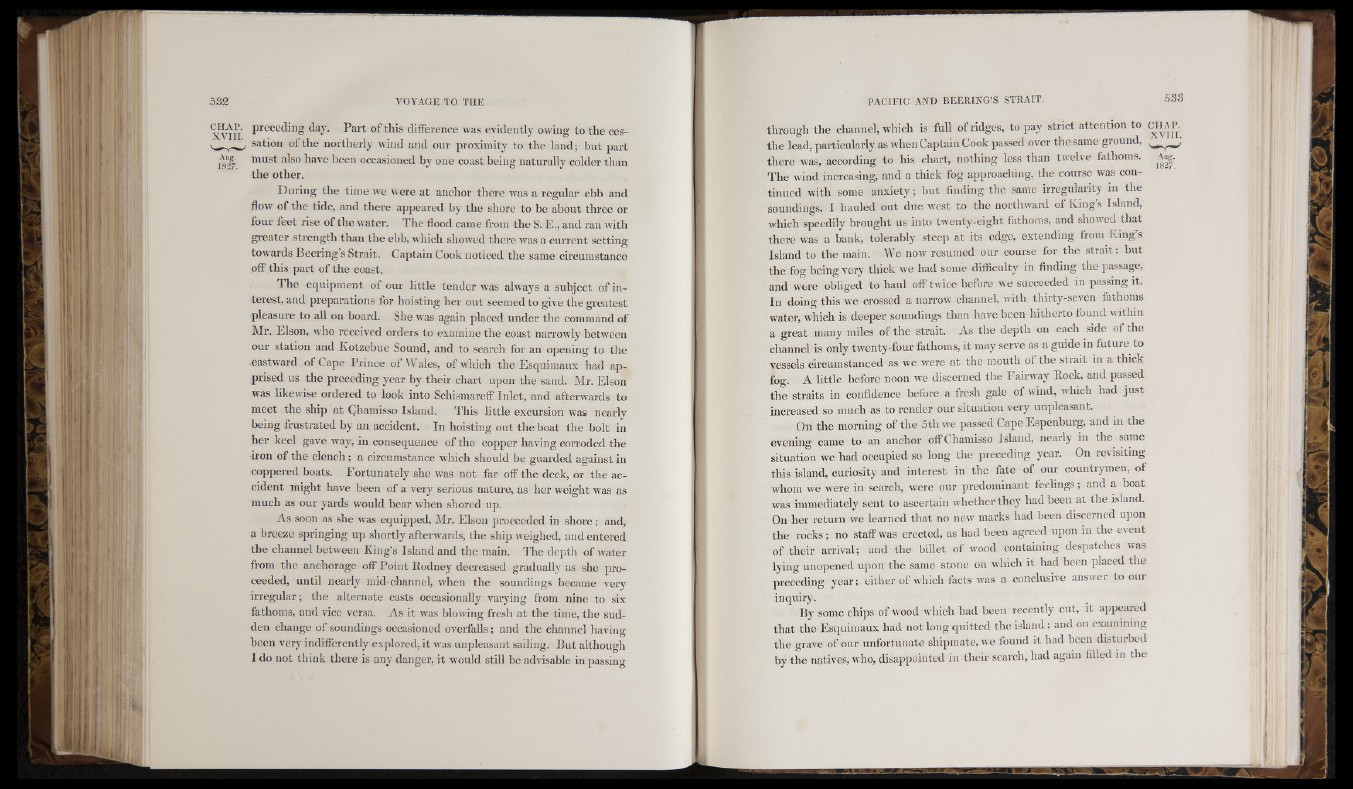
I f
! lito'
preceding day. Part of this difference was evidently owing to the cessation
of the northerly wind and our proximity to tlie land; but part
must also have been occasioned by one coast being naturally colder than
the other.
During the time we were at anchor there was a regular ebb and
flow of the tide, and there appeared by the shore to be about three or
four feet rise of the water. The flood came from the S. E„ and ran with
greater strength than the ebb, which showed there was a current setting
towards Beering’s Strait. Captain Cook noticed the same circumstance
off this part of the coast.
The equipment of our little tender was always a subject of interest,
and preparations for hoisting her out seemed to give the greatest
pleasure to all on board. She was again placed under the command of
Mr. Elson, nho received orders to examine the coast narrowly between
our station and Kotzebue Sound, and to search for an opening to the
eastward of Cape Prince of Wales, of which the Esquimaux had apprised
us the preceding year by their chart upon the sand. Mr. Elson
was likewise ordered to look into Schismareff Inlet, and afterwards to
meet the ship at Qhamisso Island. This little e.xcursion was nearly
being frustrated by an accident. In hoisting out the boat the bolt in
her keel gave way, in consequence of the copper having corroded the
iron of the clench; a circumstance which should be guarded against in
coppered boats. Fortunately she was not far offthe deck, or the accident
might have been of a very serious nature, as her weight was as
much as our yards W'ould bear when shored up.
As soon as she was equipped, Mr. Elson proceeded in shore; and,
a breeze springing up shortly afterwards, the ship weighed, and entered
the channel between King’s Island and the main. 'I'he depth of water
from the anchorage off' Point Rodney decreased gradually as she proceeded,
until nearly mid. channel, when tlie soundings became very
irregular; the alternate casts occasionally varying from nine to six
fathoms, and vice versa. As it was blowing fresh at the time, the sudden
change of soundings occasioned overfalls ; and the channel liaving
been very indifferently explored, it was unpleasant sailing. But although
I do not think there is any danger, it would still be advisable in passing
through the channel, which is full of ridges, to pay strict attention to a iAi>.
the lead, particularly as when Captain Cook passed over the same ground,
there was, according to his chart, nothing less than twelve fathoms. Aug.
The wind increasing, and a thick fog approaching, the course was continued
with some anxiety ; but finding the same irregularity in the
soundings, I hauled out due west to the northward of King’s Island,
which speedily brought us into twenty-eight fathoms, and showed that
there was a bank, tolerably steep at its edge, extending from King’s
Island to the main. We now resumed our course for the strait; but
the fog being very thick we had some difficulty in finding the passage,
and were obliged to haul otf twice before we succeeded in passing it.
In doing this we crossed a narrow channel, with thirty-seven fathoms
water, which is deeper soundings than have been hitherto found within
a great many miles of the strait. As the depth on each side of the
channel is only twenty-four fathoms, it may serve as a guide in future to
vessels circumstanced as we were at the mouth of the strait in a thick
fog. A little before noon we discerned the Fairway Rock, and passed
the straits in confidence before a fresh gale of wind, which had just
increased so much as to render our situation very unpleasant.
On the morning of the 5th we passed Cape Espenburg, and in the
evening came to an anchor off Chamisso Island, nearly in the same
situation we had occupied so long the preceding year. On revisiting
this island, curiosity and interest in the fate of our countrymen, of
whom we were in search, were our predomiimnt feelings ; and a boat
was immediately sent to ascertain whether they had been at the island.
On her return we learned that no new marks had been discerned iqion
the rocks; no staff'ivas erected, as had been agreed upon in the event
of their arrival; and the billet of wood containing despatches was
lying unopened upon the same stone on which it had been placed the
preceding year; either of which facts was a conclusive answer to our
inquiry.
By some chips of wood which had been recently cut, it appeared
that the Esquimaux had not long quitted the island ; and on examining
the grave of our unfortunate shipmate, we found it had been disturbed
by the natives, who, disappointed iu their search, had again filled in the
tilk